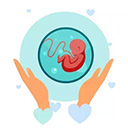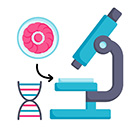
How Pelvic Inflammatory Disease Affects Fertility: A Specialist’s Perspective
Years ago, I met a patient named Maria. She was 29, vibrant, and full of hope, but also carrying the burden of infertility. Maria had been trying to conceive for over a year when her gynecologist referred her to my clinic. She had a history of pelvic pain and irregular cycles but didn’t think much of it—until her fertility journey hit a wall.
After running some tests, we discovered the cause of Maria’s struggle: pelvic inflammatory disease (PID). PID is an infection that can silently damage the reproductive system, leaving many women unaware of its long-term effects. For Maria, the damage had already affected her fallopian tubes, making natural conception extremely difficult. Her story highlights the importance of understanding PID and addressing it before it impacts fertility.

What Is Pelvic Inflammatory Disease?
Pelvic inflammatory disease is an infection of the female reproductive organs. It usually starts with bacteria, often from sexually transmitted infections (STIs) like chlamydia or gonorrhea, traveling upward from the vagina into the uterus, fallopian tubes, or ovaries. While PID can sometimes cause noticeable symptoms, it’s often a silent intruder.
Dr. Sarah Collins, an infectious disease specialist, explains,
“The biggest challenge with PID is that many women don’t realize they have it until the damage is done. Left untreated, it can lead to scarring, blockages, and even permanent infertility.”

How PID Leads to Infertility
PID damages the reproductive organs in several ways, often making conception difficult or impossible:
- Scar Tissue Formation: Infections can cause inflammation, leading to scar tissue that obstructs the fallopian tubes. This blocks the path of the egg to the uterus.
- Ectopic Pregnancy Risk: If the tubes are partially damaged, the egg might get stuck, increasing the risk of a life-threatening ectopic pregnancy.
- Ovarian Damage: Severe cases of PID can spread to the ovaries, impairing egg quality and ovulation.
- Chronic Inflammation: Long-term inflammation from untreated infections can disrupt the entire reproductive system.
Maria’s case involved significant scarring in both fallopian tubes, which left IVF as her only realistic option for conception.
Symptoms Women Shouldn’t Ignore
One of the challenges with PID is its subtlety. Many women, like Maria, don’t realize something is wrong until they face fertility challenges. Common symptoms include:
- Pelvic pain or pressure
- Irregular menstrual cycles
- Pain during intercourse
- Unusual vaginal discharge
- Fever or chills
However, some women experience no symptoms at all. That’s why routine check-ups and STI testing are crucial for early detection and treatment.
Diagnosing PID and Its Effects on Fertility
Diagnosing PID often starts with a patient’s history and physical exam. Blood tests and ultrasounds can provide more information, but in many cases, the damage is only fully understood through a laparoscopy—a minimally invasive surgery that allows us to see the reproductive organs directly.
In Maria’s case, a hysterosalpingogram (HSG)—an X-ray test with contrast dye—revealed blocked tubes. It was a difficult moment for her to hear the diagnosis, but it also gave us a clear direction for her treatment.
Treatment Options for PID-Related Infertility
Treatment depends on the severity of the infection and the extent of the damage. Here are the most common approaches:
- Antibiotics: For active infections, a course of antibiotics is the first step. This can stop the infection but cannot undo existing damage.
- Surgery: If scar tissue is minimal, surgical intervention can sometimes restore function. However, surgery isn’t always effective, especially if the damage is extensive.
- IVF (In Vitro Fertilization): For many women with PID-related infertility, IVF bypasses the damaged fallopian tubes entirely. Eggs are retrieved directly from the ovaries, fertilized in a lab, and implanted into the uterus.
Dr. Ahmed Khalil, a reproductive surgeon, notes,
“When the fallopian tubes are severely damaged, IVF offers the best chance for a healthy pregnancy. It’s a game-changer for women dealing with PID.”
The Emotional Impact of PID and Infertility
Beyond the physical challenges, PID-related infertility takes an emotional toll. Many women feel frustration, guilt, and sadness over a condition they didn’t know they had. Maria confided in me, “I kept wondering if I could have prevented this if I had known sooner. It’s hard not to feel like I failed myself.”
For women like Maria, emotional support is as vital as medical care. Whether through counseling, support groups, or connecting with others who’ve faced similar struggles, addressing the mental health side of infertility is essential.
A Happy Ending for Maria
After discussing her options, Maria decided to pursue IVF. The journey was demanding—mentally, physically, and financially—but it brought her the outcome she’d been dreaming of. A year later, Maria returned to my clinic, holding her newborn son and smiling brighter than I’d ever seen.
Her story is a testament to resilience and the incredible advancements in fertility treatments that offer hope to women with PID.
Final Thoughts
As a fertility specialist, I’ve seen how PID can silently disrupt a woman’s dreams of motherhood. But with early detection, proper treatment, and modern reproductive technologies, there’s hope for almost every patient.
If you suspect you might have PID or are struggling with infertility, don’t wait. Seek medical advice, take control of your reproductive health, and remember—you are not alone. There are solutions, and the journey to parenthood is still within reach.







